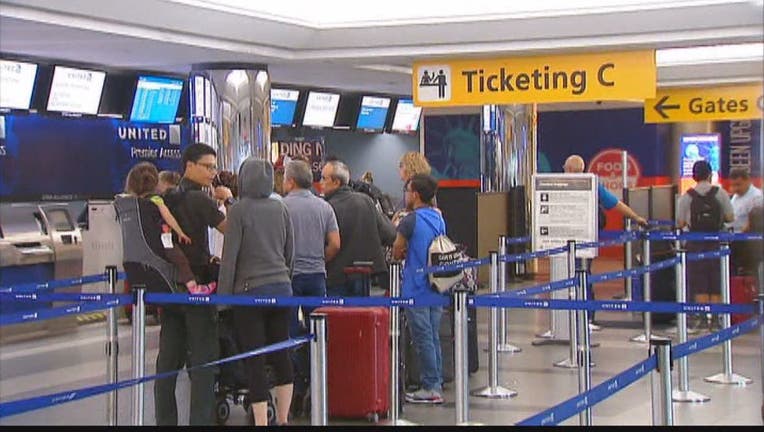No electronics on some US-bound jets from Mideast, Africa

WASHINGTON - (AP) -- The U.S. government is ordering passengers on nonstop, U.S.-bound flights from a handful of mostly Middle Eastern and North African countries to pack electronic devices other than cellphones in their checked bagged.
Senior Trump administration officials said that starting Tuesday morning airlines flying directly to the United States from 10 airports in eight countries starting passengers that only cellphones and smartphones will be allowed in the passenger cabin of U.S.-bound flights. Other electronics, including laptops and tablets, will be indefinitely banned from the passenger cabin.
The officials said the airlines will have 96 hours to implement the security order or face being barred from flying to the United States. The officials spoke on the condition of anonymity to discuss the security ban despite President Donald Trump's repeated insistence that anonymous source should not be trusted.
The electronics ban affects flights from international airports in Amman, Jordan; Kuwait City, Kuwait; Cairo; Istanbul; Jeddah and Riyadh, Saudi Arabia; Casablanca, Morocco; Doha, Qatar; and Dubai and Abu Dhabi in the United Arab Emirates. About 50 flights a day, all on foreign carriers, will be impacted. The officials said no U.S.-based airlines have non-stop flights from those cities to the United States.
The officials said the decision was prompted by "evaluated intelligence" about ongoing potential threats to airplanes bound for the United States. The officials would not discuss the timing of the intelligence or if any particular terror group is thought to be planning an attack.
The ban would affect laptops, iPads, cameras and most other electronics. Royal Jordanian Airlines tweeted about the ban Monday, telling passengers that medical devices would also be allowed onboard with passengers.
Details of the ban were first disclosed by Royal Jordanian and the official news agency of Saudi Arabia.
In its statement, Royal Jordanian said the electronics ban would affect its flights to New York, Chicago, Detroit and Montreal.
Brian Jenkins, an aviation-security expert at the Rand Corp., said the nature of the security measure suggested that it was driven by intelligence of a possible attack. There could be concern about inadequate passenger screening or even conspiracies involving insiders -- airport or airline employees -- in some countries, he said.
Homeland Security Secretary John Kelly phoned lawmakers over the weekend to brief them on aviation security issues that have prompted the impending electronics ban, according a congressional aide briefed on the discussion. The aide was not authorized to speak publicly about the issue and spoke on the condition of anonymity.
The administration officials who briefed reporters about the ban said foreign officials were told about the impending order starting Sunday.
A U.S. government official said such a ban has been considered for several weeks. The official spoke on the condition of anonymity to disclose the internal security discussions by the federal government.
The ban would begin just before Wednesday's meeting of the U.S.-led coalition against the Islamic State group in Washington. A number of top Arab officials were expected to attend the State Department gathering. It was unclear whether their travel plans were related to any increased worry about security threats.
Another aviation-security expert, Jeffrey Price, said there could be downsides to the policy.
"There would be a huge disadvantage to having everyone put their electronics in checked baggage," said Price, a professor at Metropolitan State University of Denver. He said thefts from baggage would skyrocket, as when Britain tried a similar ban in 2006, and some laptops have batteries that can catch fire -- an event easier to detect in the cabin than the hold.
Most major airports in the United States have a computer tomography or CT scanner for checked baggage, which creates a detailed picture of a bag's contents. They can warn an operator of potentially dangerous material, and may provide better security than the X-ray machines used to screen passengers and their carry-on bags. All checked baggage must be screened for explosives.
------
Associated Press writers David Keonig in Dallas, and Matthew Lee, Joan Lowy and Ted Bridis in Washington contributed to this report.
© 2017 The Associated Press. All rights reserved. This material may not be published, broadcast, rewritten or redistributed.

